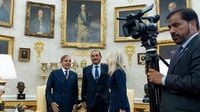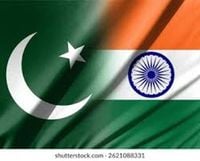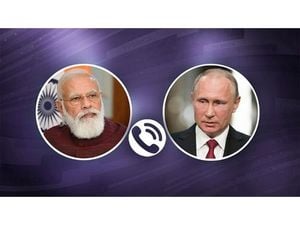When Pakistani Prime Minister Shehbaz Sharif took the stage at the United Nations General Assembly in New York on September 26 and 27, 2025, few anticipated the diplomatic fireworks that would follow. In a speech that quickly reverberated across South Asia and beyond, Sharif made the bold move of nominating former U.S. President Donald Trump for the Nobel Peace Prize, crediting him with preventing what he described as a catastrophic war between nuclear-armed neighbors India and Pakistan. The claim, dramatic as it was, came amid heated accusations, sharply conflicting narratives, and a renewed focus on the fragile peace in the region.
Sharif’s address, delivered to a global audience, was nothing if not assertive. He lauded Trump as “a man of peace,” and insisted that Trump’s “timely and decisive” intervention in May 2025 averted disaster. “Had he not intervened, the consequences would have been catastrophic,” Sharif declared, according to Reuters. He argued that the Nobel nomination was the least Pakistan could do to recognize “Trump’s wonderful and outstanding contribution to promote peace.”
This high-profile announcement was not made in a vacuum. It came on the heels of a volatile spring, marked by India’s launch of Operation Sindoor on May 7, 2025, in response to a devastating terror attack in Pahalgam that killed 26 civilians. India said the attack was orchestrated by terrorist groups operating from Pakistani territory—a charge Islamabad has repeatedly denied. In retaliation, India targeted what it described as terror camps across the border, while Pakistan claimed to have shot down seven Indian jets in the ensuing aerial conflict. Sharif, never one to shy from strong rhetoric, praised his country’s air force as “falcons” and boasted, “Those pilots flew and destroyed the Indian aircraft.”
India, for its part, has consistently dismissed these claims as fantasy. New Delhi maintains that only direct military-to-military talks between the countries’ Director Generals of Military Operations (DGMOs) led to the ceasefire, with no American mediation involved. Prime Minister Narendra Modi informed Trump in June that “no American mediation took place,” and Indian officials have continued to reject what they call “absurd theatrics” and “bizarre” assertions from Islamabad. First Secretary Petal Gahlot, speaking at the UN, offered a scathing rebuttal: “No amount of theatrics and no level of falsehood can hide the facts.” She went further, accusing Sharif of “glorifying terrorism—which remains at the core of Pakistan’s foreign policy.”
The diplomatic drama didn’t end with claims and counterclaims about the ceasefire. Sharif used his UN platform to highlight other grievances, most notably India’s decision to suspend the Indus Waters Treaty following the Pahalgam attack. The treaty, brokered by the World Bank in 1960, governs the use of crucial river systems shared by the two countries. Sharif called India’s move “an act of war” and a violation of both the treaty and international law. “Pakistan has made it abundantly clear that we will defend the inseparable right of our people on these waters,” he said, as reported by the Indian Express. India’s response was swift and dismissive, with officials emphasizing that such statements “distort reality and reflect a misguided narrative.”
Beyond the sharp rhetoric, the diplomatic maneuvering was unmistakable. In the days leading up to his UN speech, Sharif and Pakistan’s Army Chief Asim Munir met with Trump and U.S. Secretary of State Marco Rubio, signaling Islamabad’s intention to reset its relationship with Washington. Sharif became the first Pakistani Prime Minister in six years to visit the White House, underscoring the significance of the outreach. He also expressed gratitude to a host of countries—including China, Turkey, Saudi Arabia, Qatar, Azerbaijan, Iran, and the United Arab Emirates—for their diplomatic support during the spring’s military standoff.
Yet, the facts on the ground remain deeply contested. While Sharif insisted that “Pakistan won the war, and now we seek to win peace,” India’s official stance is that its military targeted terror infrastructure with precision, minimized civilian harm, and did not lose seven jets. India also demanded that Pakistan take concrete action against terrorism by handing over wanted suspects said to be residing on Pakistani soil. The Indian government pointed to Pakistan’s history of sheltering terrorists, including Osama bin Laden, and highlighted recent instances where Islamabad shielded groups like the Resistance Front at the UN Security Council.
For observers, the war of words at the UNGA was as much about international perception as it was about facts on the ground. Sharif’s praise for Trump’s “bold and visionary leadership” and his repeated references to the Nobel Peace Prize nomination were clearly intended to cast Pakistan as a willing partner for peace, even as India accused its neighbor of distorting facts for political gain. Sharif’s call for a comprehensive dialogue on all outstanding issues—including Kashmir—was paired with harsh language, referring to India as “the enemy” and condemning its actions in both Kashmir and Gaza.
India, meanwhile, sought to turn the tables, painting Pakistan as the true aggressor and the main obstacle to lasting peace. Petal Gahlot’s remarks at the UN were blunt: “No degree of drama and no level of lies can conceal facts.” She accused Pakistan of using “theatrics” to distract from its own record on terrorism and insisted that the ceasefire was the result of bilateral talks, not outside intervention.
The international community has watched this diplomatic sparring with a mix of concern and fatigue. The dispute over Kashmir, the recurring violence, and the mutual accusations of bad faith have been a grim feature of South Asian geopolitics for decades. The Indus Waters Treaty, long seen as a rare example of successful cooperation, now hangs in the balance. The Nobel Peace Prize nomination, while headline-grabbing, is unlikely to resolve the deeper issues at play.
Still, the events at the 2025 UNGA serve as a stark reminder: in South Asia, peace remains fragile, and the path to stability is littered with mistrust, competing narratives, and political posturing. Whether Trump’s name will ever be etched onto a Nobel medal is uncertain, but the region’s search for a lasting settlement continues—one speech, and one sharp rebuttal, at a time.





